Special Reports
Location, Location, Location

If you’re a presenter in Seattle, you’re probably not selling many tickets to people in Kansas City (and you’re not trying to). The bulk of your ticket sales takes place within a fairly confined geographic area.
Enter “location-based” social media services. You’ve personally used location-based services (LBS), probably without realizing it, and it’s a fair bet your customers are also already using LBS. Many are likely reviewing and sharing your venue and concerts, so it’s time to get up to speed.
A LBS is any service that requests your current location or inherently uses GPS technology, often through the use of a smart-phone. This includes anything from finding directions on Google Maps to “checking in” on Foursquare (more on that later), to searching for nearby deals. There are three basic benefits to employing LBS:
- Reaching potential patrons in your immediate area
- Reaching future patrons who are making plans to be in your area
- Enabling patrons to share updates from your venue with their social network
How LBS works
As you might guess, LBS goes hand-in-hand with mobile technology. There are two components to LBS: tag and search. Tagging allows a user to create some kind of content—a tip, review, photo, etc.—and “attach” it, or tag it, to a particular location. In other words, tagging allows someone to, say, write a quick review of his or her experience at your venue and “attach” it to your venue’s location so others can read it. Searching allows users to find that review or photo that’s been “tagged” to your location.
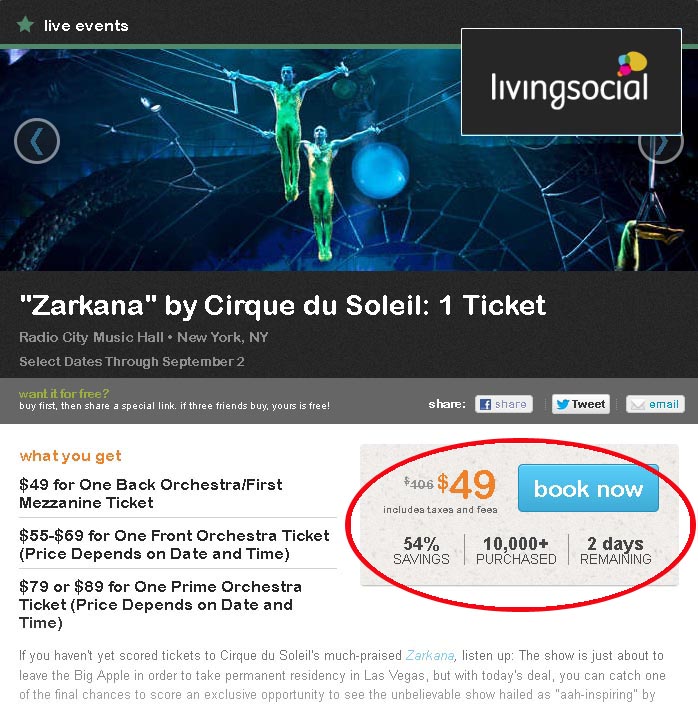
Examples of location-based services abound. For instance, businesses contract with the popular “daily deal” site LivingSocial to offer its users deeply discounted deals on everything from
restaurants to facials—to tickets to performing arts events. Cirque du Soleil has sold more than
10,000 tickets to its Zarkana performances. Users of LivingSocial register and choose their locale; LivingSocial then offers up deals in their area through email and other contact points.
Real-time reach with Yelp and foursquare
On any given performance night, there are likely to be potential patrons in your area looking for something to do. Smartphone users will rely on the web and popular LBS applications to help them decide where to spend their time.
You can update your information on these LBS applications to help the mobile audience find you. Your mobile, spur-of-the-moment audiences—the prime target for last-minute ticket sales—are probably using Yelp and foursquare . [Editor’s note: The foursquare company chooses to not capitalize its name.]
Yelp
Yelp should be considered more of a customer service tool than anything else. It is a place where your customers can rate venues and leave reviews. Creating your free business account on Yelp is easy. With a Yelp business account, you can message your customers and respond to reviews either publicly or privately. An interesting trend to note: In major metropolitan areas, music halls and theaters are often the top-rated item under Yelp’s “nightlife” category. To get started with Yelp, go here.
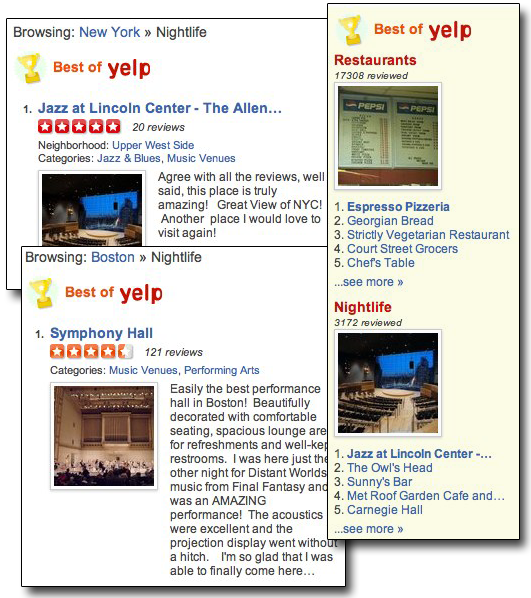
foursquare
It is entirely likely that your venue is already being visited and reviewed by foursquare users. Whether you are managing a venue or your own brand, with over 200 million users registered on foursquare, it’s not surprising that nearly 1 million businesses are already using their tools.
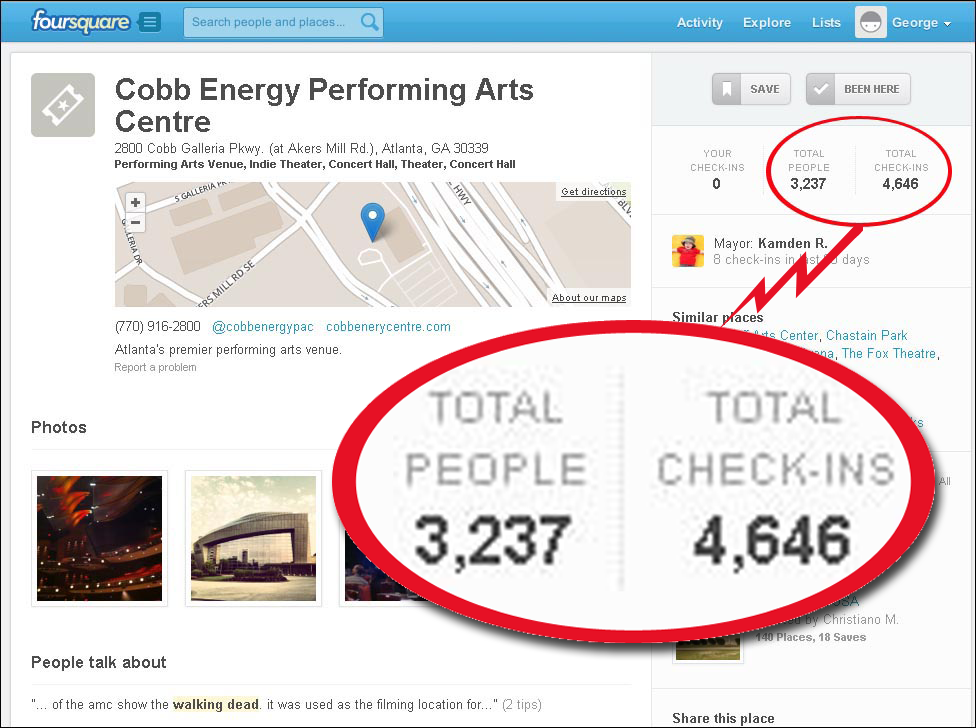
As a presenter, you can take control of your venue’s foursquare page at no cost. After officially claiming your location on foursquare, you can track customer check-ins, offer specials, and use analytics tools provided by foursquare to view photos and tips. If you have not already done a search for your location on foursquare, go here.
Specials are one of foursquare’s best features and are used by a number of presenters to attract new customers and reward loyal ones. For example:
- House of Blues Chicago offers two free tickets to its most loyal customer using foursquare
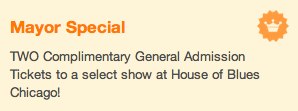
- The Fox Theatre in Atlanta, Georgia, encourages all users to check in using foursquare by having an active check-in special. In a recent run of foursquare deals, the theater offered patrons a 20 percent discount to the next show offered in a series of musicals and ballets. Russell Suave, e-commerce and social media manager at The Fox Theatre said, “We are very fortunate to have promoters who support our social efforts and allow us to cross-market upcoming shows.” Examples of this are a meet-and-greet with the performer after the show or a discount on event merchandise. One use of foursquare offered a special encore if enough people checked in to the venue on foursquare.
These specials will also help to spread the word of the event as each customer unlocks the special and shares his purchase with his social network.To get started with foursquare, go here.
Influencing ticket sales with local daily deals
“Daily deal” sites have grown tremendously in the past five years. They are considered a LBS because the offered deals are invariably for goods sold locally and to local events—such as live performances. For participating businesses, it costs money to create the deals through the daily deal services; the investment usually pays off. The most effective promotions are those that aim to create repeat customers, as opposed to offering heavily discounted one-off deals.
The most popular are probably Groupon and LivingSocial, but it’s worth checking out which other daily deal sites might be catering to your local community. According to Groupon’s statistics, 91 percent of the people purchasing deals either return or plan to return as customers to the business that offered the deals.
One of the big selling points for the daily deal services is the trend of customers buying additional products from the businesses offering the deals as well as bringing friends to the businesses offering deals. Groupon found that customers spend about 55 percent more than the value of the deal they purchased and 75 percent of businesses report that Groupon users bring friends along with them when they redeem their coupons. LivingSocial boasts similar results, stating 29 percent of their deal redeemers are new customers for the participating local businesses.
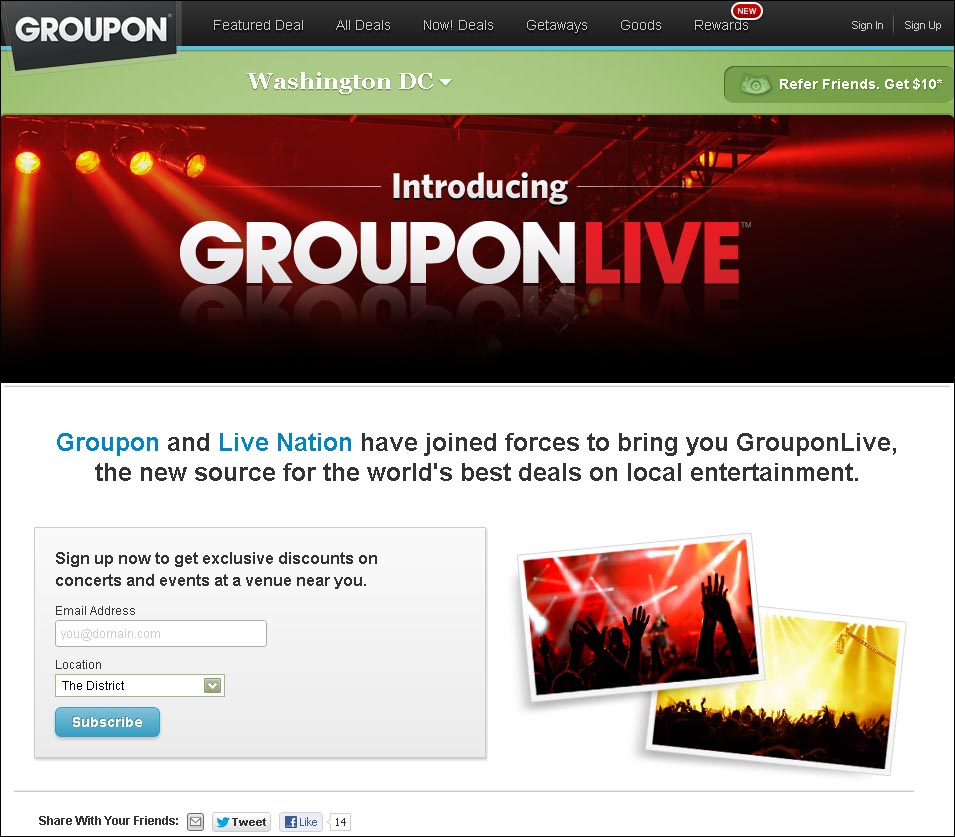
For selling tickets to performing arts events, the most relevant Groupon service is the recently launched GrouponLive. GrouponLive is targeted at driving ticket sales for live events. Campaigns can run as soon as an event is announced with a pre-sale ticket deal and continue up to the date of the performance.
To get started with Groupon, go here.
To get started with LivingSocial, go here.

Ashley Hennigan is a social media marketing consultant for small businesses and has been a featured speaker before national higher education and professional development groups. Ashley is also assistant director at Rochester Institute of Technology, where she is helps manage the University’s mobile web and social media efforts.





 FEATURED JOBS
FEATURED JOBS

 RENT A PHOTO
RENT A PHOTO


